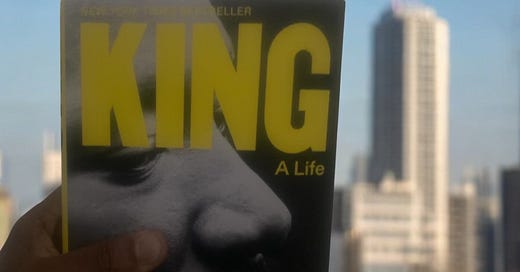In King: A Life, Pulitzer Prize winning author Jonathan Eig masterfully resurrects Martin Luther King Jr., not as an untouchable icon but as a profoundly human figure—flawed, burdened, yet utterly determined.
For decades, King’s name has been synonymous with the civil rights movement, his famous “I Have a Dream” speech etched into our collective memory. Yet, as Eig reveals in this breathtaking biography, the man behind the movement was far more intricate than his larger-than-life image suggests.
Drawing from newly declassified FBI files and exhaustive archival research, Eig paints a portrait of King as a fearless yet fragile human being, wrestling with internal and external demons as he led a revolution against systemic racism in America.
King’s evolution as a civil rights leader was far from linear. Born in Atlanta to a lineage of preachers, he inherited both the privilege of education and the burden of systemic injustice.
Eig traces King’s intellectual development from his days as a precocious student at Morehouse College to his theological studies at Boston University, where he began to weave together his Christian faith with Gandhian principles of nonviolence.
These early years laid the groundwork for his life’s mission, but it was in Montgomery, Alabama, during the 1955-56 bus boycott, that King emerged as a national leader. His ability to galvanize the oppressed, despite death threats and the firebombing of his home, revealed a core truth about his character: his strength was inseparable from his vulnerability.
As I reflect on Eig’s portrayal on this, Martin Luther King Jr. day of 2025, I’m struck by how he embraced the struggle amid insurmountable systemic barriers. King was fully aware of the forces aligned against him—segregationists, an indifferent federal government, and a virulent FBI under J. Edgar Hoover that sought to discredit him at every turn.
And yet, he persisted. What resonates deeply with me is King’s understanding that true leadership demands courage, not in the absence of fear but in its acknowledgment.
He once said, “Courage is the power of the mind to overcome fear.”
His life was a testament to this principle, as he marched into hostile towns, faced police brutality, and endured the constant threat of assassination, all while carrying the weight of a movement on his shoulders.
King’s courage was not limited to physical bravery; it extended to his willingness to challenge societal norms, even when it made him unpopular.
In King: A Life, Eig highlights moments where King’s vision expanded beyond racial equality to economic justice and anti-war advocacy, notably in his opposition to the Vietnam War. These stances alienated many allies, including President Lyndon B. Johnson and segments of the Black middle class.
Yet, King understood that the fight for justice was not confined to one issue—it was a fight against all forms of oppression. In an era where convenience often dictates morality, King’s commitment to his principles, even at great personal and professional cost, feels both inspiring and instructive.
Today, in 2025, King’s life holds profound significance for modern civil rights movements. The issues he championed—racial equality, economic justice, and nonviolent resistance—remain as urgent as ever.
In a time when systemic racism continues to manifest in new forms, from voter suppression to economic disparities, King’s strategy of peaceful but relentless activism offers a blueprint for change.
Moreover, Eig’s book challenges us to see King not as a distant figure from history but as a model for how to engage with the present. His ability to navigate uncomfortable truths and embrace the complexities of leadership is a lesson for anyone striving to make a difference in a fractured world.
What strikes me most about King, as rendered by Eig, is his capacity to lead despite the constant discomfort and danger he faced. He was a man hunted by his own government, harassed by critics on all sides, and tormented by bouts of self-doubt. And yet, he found solace in his faith and purpose in the struggle.
There’s a moment in Eig’s biography where King, after receiving yet another death threat, prays aloud in his kitchen, asking for the strength to go on. In that moment, King’s humanity and divinity converge, reminding us that even the greatest leaders are shaped by moments of profound vulnerability.
For me, King’s life underscores the power of enduring in the face of adversity. As someone who has grappled with barriers in my own life, I find inspiration in King’s journey.
His willingness to embrace the struggle, to confront discomfort and injustice head-on, offers a path forward—not just for activists but for anyone seeking to live authentically and courageously.
Jonathan Eig’s King: A Life is more than a biography; it is a call to action. It challenges us to see Martin Luther King Jr. not as a mythic figure but as a man who dared to dream, struggle, and lead.
In doing so, it reminds us that the work of justice is not confined to history books but lives on in the choices we make today. King’s legacy, as Eig so vividly captures, is not just a reminder of where we’ve been but a guide for where we must go.
Join us today as a paid member supporter. Or feel free to tip me some coffeehouse love here if you feel so inclined.
Your contributions are appreciated!
Every bit counts as I strive to deliver high quality feature articles into your inbox on a regular basis. Never any paywalls, just the opportunity to foster community, connection, and conversation one book at a time.







I love this. Thank you so much for sharing.
Reading Eig's book now. King is truly a profile in courage. Reminds me of Pericles' observation:
"The secret of happiness is freedom. The secret of freedom is courage".